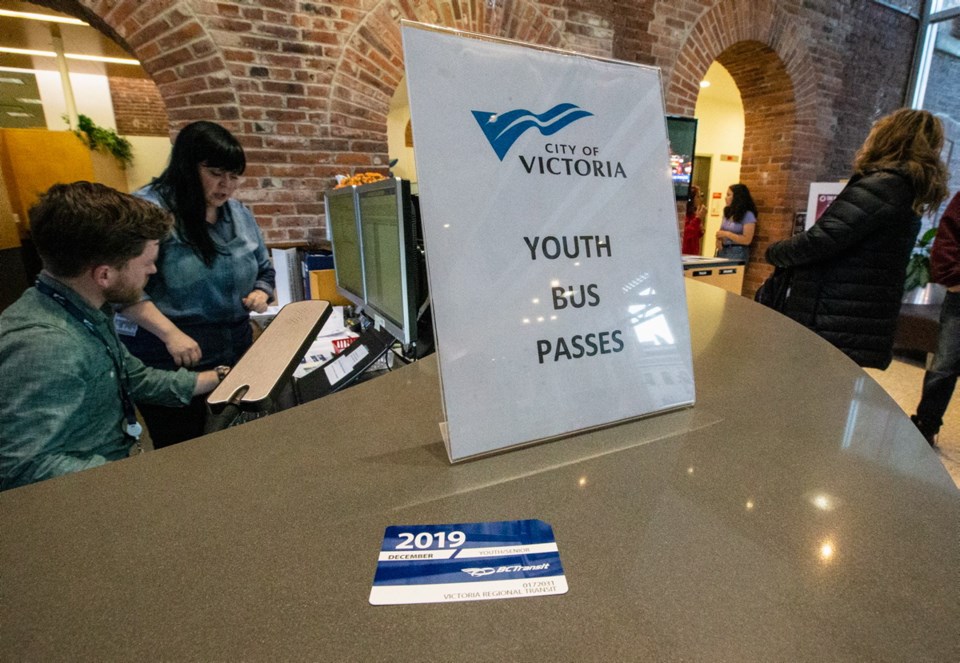Victoria youth under 19 can start picking up their free December transit bus passes from city hall.
The city launched its free bus-pass program Tuesday in a move designed to boost transit ridership, reduce traffic congestion and promote low-carbon affordable transportation.
“We’ll see how many students and parents are traipsing in here over the next couple of weeks to pick up the passes for December,” Mayor Lisa Helps said in an interview. “We anticipate that pickup is going to be quite high.”
By next September, the city hopes to have a U-Pass program in place where young people will be able to use their student identification cards as bus passes, the way college and university students do.
But until then, youth or their parents and guardians will have to supply proof of age and residency in Victoria every month to obtain their passes at city hall Monday to Friday, 8 a.m. to 4:30 p.m.
Helps hopes the program will encourage a new generation of transit riders while reducing greenhouse-gas emissions.
“We’re doing it for climate purposes, but we’re also doing it for health and well-being and community-integration purposes,” she said. “When everyone can ride the bus, it means no one is left behind. It means kids have equal access to recreation, to school, to activities. And it gives kids freedom to move, a sense of autonomy.”
It also means substantial cost-savings for families, she said.
“If a parent has two kids and they’re buying transit passes currently, that’ll put $1,000 a year back in parents’ pockets, so they can reinvest in ballet classes or violin lessons or maybe food or rent if things are tight.”
Victoria plans to spend $972,000 a year to buy passes for an estimated 7,200 youth in the city — whether or not they pick up their passes.
City council will cover part of the cost with revenue from Sunday parking fees that took effect in May and are expected to bring in about $500,000 to $600,000 a year.
Victoria had hoped to negotiate a deal where it would buy only as many bus passes as it needed for the U-Pass rate of $11.25 per month — at least until it could get its own U-Pass program up and running next fall.
But B.C. Transit only offers the U-Pass rate if a fee is assessed for every eligible youth in the program. In that way, post-secondary students who don’t use their U-passes are effectively subsidizing students who do.
Transit does offer an opt-in program under which the city could have purchased only as many passes as it needed, but the rate for that program is much higher at $40.50 per pass.
Victoria tried to get the opt-in program at the $11.25 rate, but members of the Victoria Regional Transit Commission worried that approving a hybrid model would erode transit revenues and result in other municipalities subsidizing Victoria.
So Helps agreed that the city would buy passes for all 7,200 youth at $11.25 each.
“This is doable for the city,” she told the commission on Nov. 5. “Some of this will be funded by the 2019 budget, some of it will be coming from the 2020 budget. But we can say for certain that not one cent of subsidization will come from other local governments to the City of Victoria.”
It’s a risk, because if only a few hundred young people take advantage of the program each month, taxpayers could end up paying a premium for the passes.
“But the reality is that no innovation happens without risk,” Helps said. “Maybe it will take us going into classes or parent advisory committee meetings. We’ll see. It will be very easy to promote the program if the uptake is not as good as we wish.”
City officials say they plan to push the program using social-media posts and online advertising and by reaching out to community and neighbourhood organizations, youth groups and schools. “I think kids will be the best champions of this program and, hopefully, will drive the uptake as well,” Helps said.
Details on how to obtain a pass and the documentation required are available on the city’s website at victoria.ca.
The city says it will accept a B.C. Health Services card, a B.C. Identification card or a B.C. driver’s licence — each with current address — to prove age and residency. If a youth doesn’t have one of the documents with a Victoria address, the website provides a list of other documents that will be accepted.
Each monthly pass will permit unlimited rides on B.C. transit buses and handyDART services for registered handyDART customers. Replacements will not be provided for lost or stolen cards.
lkines@timescolonist



